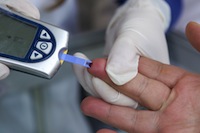
The threat of such dire measures is what keeps many diabetics so strictly on their medications. However, the results of a clinical trial evaluating the side effects of canagliflozin (more commonly known as Invokana or Invokamet) has some medical professionals wondering if the drug is actually causing some diabetic foot and leg amputations. As a result, the FDA has issued a drug safety announcement.
Invokana is a type of drug known as a sodium-glucose cotransporter-2 inhibitor, or SGLT2 inhibitor for short. SGLT2 inhibitors works by recruiting the kidneys in the effort to remove sugar from the patient’s body. Since the kidney’s become involved in the process, the excess sugar is expelled from the body via the patient’s urine. It is generally used in conjunction with diet and exercise.
It is worth noting that the study does not actually find causality between Invokana and amputations. However, the rates of diabetic amputation were higher in patients taking Invokana than in patients that were treated with a placebo. While just three out of every 1,000 patients treated with a placebo had to have some sort of diabetes-related amputation, as many as 7 in 1,000 underwent an amputation when treated with Invokana.
These patient groups were tracked over the course of about four and a half years. A second trial which has tracked patients for nine months to this point has not yielded the same result. However, the FDA is still gathering data and is not ready to state categorically whether Invokana does or does not increase the risk of diabetes-related amputation.
Diabetics and their doctors are urged to assist the FDA with gathering this information by reporting Invokana side effects to the FDA’s MedWatch program.
